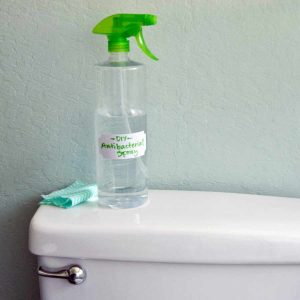Finding proper cleaning products such as disinfectants which can kill off germs on surfaces within minutes, has become difficult due to mass shortage as a result of the coronavirus outbreak.
If you cannot find one, the alternative would be to make an effective disinfectant at home with any of the options below.
 How to make disinfectant spray
How to make disinfectant spray
According to the CDC, in the absence of proper disinfectants, you can use diluted household bleach solutions or alcohol solutions with at least 70% alcohol to disinfect an area or item.
Alcohol solutions
Regular rubbing alcohol that contains at least 70% alcohol can be used to disinfect surfaces if left for at least 30 seconds. However, it may not be ideal to use alcohol to disinfect large surfaces because the stronger the alcohol, the faster it evaporates. This means that it may not last long enough on surfaces to kill off germs.
Bleach solutions
This is the best alternative to use in disinfecting surfaces. Household bleach is inexpensive and can cover large surfaces.
Bleach emits potentially lethal fumes and as a result, should be diluted and used only in well-ventilated spaces. Wear gloves and protective clothing while handling bleach. To make disinfectants from bleach, you will need the following:
Ingredients and supplies
- 5 tablespoons or ⅓ cup of household bleach (or use 4 teaspoons bleach per quart of water for a smaller quantity)
- 1 gallon of water
- Rubber gloves
- Spray bottle or container
- Measuring cup
Steps:
- Measure out 5 tablespoons/ ⅓ cup of bleach and 1 gallon of water and keep aside.
- Carefully pour the bleach into the container or spray bottle. Then add the water.
- Close the lid tightly and gently shake the bottle to mix the solution. You can now use the solution to disinfect surfaces.
Clean surfaces with soap and water or detergent, then apply this bleach solution and let it remain on the surface for at least 10 minutes before you wipe it off. Dilute only small quantities of bleach for daily use because chlorine bleach rapidly loses its disinfectant power when exposed to light and when mixed with water.
Bleach is generally safe on hard surfaces but do your research first to know if it is safe on other surfaces. Do not mix bleach with ammonia, acidic compounds, or alcohol as this may produce very dangerous and deadly gases.

 How to make disinfectant spray
How to make disinfectant spray

